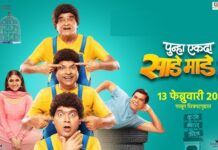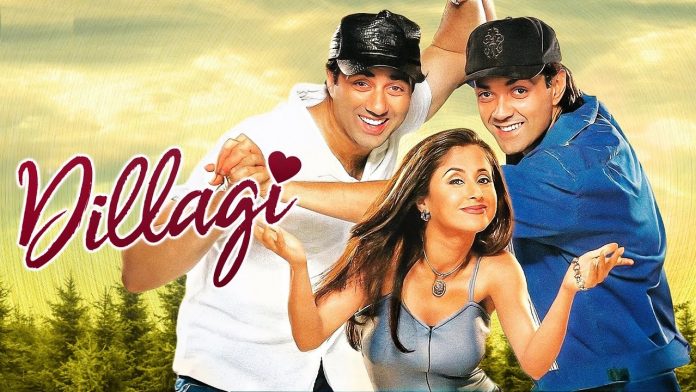DILLAGI
Vijayta Films’ Dillagi (UA) is a love triangle of the kind seen several times earlier. Two brothers, who are extremely fond of each other, fall in love with the same girl. Both of them don’t know about the other’s love for the girl. Actually, the younger brother himself is not aware that he has fallen in love with the girl who is his college mate and who loves him with all her heart.
The elder brother is a serious businessman and falls in love with the girl at first sight. The girl, unaware of this, falls in love with her college pal who happens to be the younger brother of the businessman. On his part, the younger brother is such a Casanova that the concept of love and marriage don’t exist in his scheme of things. He considers the girl as his close friend and that’s about all. The boys’ family takes a proposal of marriage (for the elder son) to the girl’s family but the girl refuses to give her consent as she is in love with her college pal. When, after this, she proposes marriage to the pal (who is the younger brother), she is in for an emotional shock as the boy scoffs at her seriousness. The elder brother enters her life again and she ultimately gets wooed by him. Till this stage, neither of the three players is aware that the two boys who are entangled in the love triangle are the two brothers themselves. All hell breaks loose when this comes to light. The climax is about how the tension is resolved.
Sutanu Gupta’s screenplay is ridiculous, to say the least. Characterisations are sketched so shabbily and childishly that it is a wonder how debut-making director Sunny Deol took up the project in the first place. The elder brother (Sunny Deol) is shown unnecessarily tense and uncomfortably reserved always, and the only two reasons that one can conjure up for that are that he has lost his mother when he was a child and he has worked hard to become a top businessman! On the other hand, the younger brother (Bobby Deol) is shown as a man of easy virtues and, therefore, his repentance in the climax looks like a farce. Also, why he has a change of heart (towards the girl) in the pre-climax is a mystery. His rude behaviour with the elders in his family also looks unwarranted. On her part, the girl (Urmila Matondkar) looks like she can flit from one boy to another at the drop of a hat. The Hindi cinema-going audience will not be able to identify with both, Bobby Deol and Urmila’s, characters.
The first half is pathetically poor, with the drama hardly making any movement. Songs come in too quick a succession of each other in the pre-interval portion. The drama is a bit enjoyable in the early part of the second half (when Sunny tries to woo Urmila) but drops thereafter. The climax is fairly good but too lengthy and, by then, the viewer has been bored enough to not find the climax appealing. The boredom, to some extent, also sets in because the viewer knows all the angles of the story whereas the three main characters are kept in the dark about one aspect or the other for far too long.
The emotions don’t quite touch the heart. Even the romance hardly creates any feelings for the characters. Dialogues are good at a couple of places. Comedy appeals but only sometimes.
Sunny Deol scores in the second half. But he looks old for the role of a lover boy. Bobby Deol is alright but suffers on account of a faulty characterisation. Urmila Matondkar looks pretty and does well in the routine scenes but needs to get her act — and dialogue delivery — right in emotional scenes. Zohra Sehgal delivers a lovely performance and is veritably cute as the boys’ grandmother. Dara Singh, Kulbhushan Kharbanda and Reema lend average support. Harish Patel, Vijay Kashyap and Sushmita Mukherjee irritate more than entertain with their comedy. Raj Zutshi, Deepshikha, Parvin Dabas, Amrik Randhawa, Surekha Sikri and the others are ordinary. Preity Zinta comes as a pleasant surprise in a special appearance at the fag end.
Sunny Deol’s direction relies more than it was necessary, on the tried and tested formula. His handling of some family scenes are good. But the narration leaves plenty to be desired, especially in romantic and dramatic scenes. His effort to show affection between the two brothers is overdone and even that has hardly any impact. He may have tried to give the film a youthful look, but even in such films, the soul is very important, and that’s woefully missing. Music is fair but the love story required a hit score. The title song, ‘Kya yeh sach hai’, ‘Yeh zameen hai’, ‘Raahon mein chhaayee’ and the ‘Kotha pa leya’ are the better songs. But there are so many songs and since not a single is a hit, at least two or three can and should be deleted. This, coupled with judicious re-editing of several scenes, will also take care of the length of the film and its terribly slow tempo. A total length of running time of 25 to 30 minutes needs to be chopped off. Song picturisations are quite similar to each other — the top-shot technique having been employed far too often. Camerawork (Manmohan Singh, Jeeva and Sameer Arya) is wonderful. Foreign locations are also brilliant. Production values are as grand as grand can be. Technically, very good. Action and thrilling scenes (Tinnu Verma) are pretty exciting.
On the whole, Dillagi is a dull fare and fails to make any impact on the viewer. It will entail heavy losses to its distributors, considering that it has not even opened to reasonably exciting houses.
Released on 19-11-’99 at Metro and 18 other cinemas of Bombay thru Nicks Investment P. Ltd. Publicity: excellent. Opening: fair. …….Also released all over. Opening was excellent in East Punjab and average in Delhi but dull in C.P.CI. Rajasthan, Nizam and several places in other circuits.
LATEST POSITION
DILLAGI has opened to shockingly dull houses in many parts of the country.
Jurm Ka Vinashak (dubbed) 1st week Allahabad (4 days) 15,700, Gorakhpur 50,000.
Titanic (dubbed) 10 days Akola 1,57,290, very good.
Hum Saath-Saath Hain has done extraordinary in 2nd week too in Gujarat, C.P. Berar and Nizam and is very good in Bombay, Maharashtra, Bihar, C.I. and Rajasthan. It has picked up at many stations of Gujarat and C.P. and some stations of other circuits. Matinee (12 noon) shows are being badly hit because it is a ladies’ film. However, due to high admission rates and extensive release strategy, the shares of the first 2 weeks are phenomenal — at places, unbelievable! The film faced a steep fall in Delhi-U.P. in 2nd week. All said, despite adverse talks in the trade, the film will ultimately turn out to be the fastest money-spinner of all times in many of the circuits. 2nd week Bombay 89,08,366 (80.68%) from 16 cinemas (8 on F.H.), Vasai (gross) 4,68,439, Virar (gross) 3,22,656, Panvel (gross) 2,62,286; Ahmedabad 38,47,286 from 9 cinemas, Baroda 6,45,726 from 2 cinemas, Vapi 5,67,962 from 2 cinemas, total 14,93,913, Surat 11,90,154 from 3 cinemas, Udhna 91,472, Padra 3,70,173, Navsari 1,31,720, Bharuch 4,66,913, Valsad 4,49,120, Rajkot 4,48,742 from 2 cinemas, Bhavnagar 2,58,720 from 2 cinemas, Morvi 1,61,119, Jamnagar 2,01,741, Surendranagar 1,75,324, Adipur 1,45,582 (89.72%), Jetpur 1,30,443, Bhuj 1,33,854 (81.61%), Mahuva 1,47,210; Pune 24,59,253 from 7 cinemas, Ahmednagar 3,63,142 from 2 cinemas, Kolhapur 4,19,153 from 2 cinemas, Solapur 3,52,532 (1st 3,39,779), Nasik 5,71,574 from 2 cinemas, Nasik Road 2,11,955, Barsi 1,41,942, Pandharpur 1,26,336, Ichalkaranji 2,42,090 from 2 cinemas, Satara 3,46,448 from 2 cinemas, Sangli 2,98,322 from 2 cinemas, Malegaon 1,92,907, Karad 1,00,672, Islampur 2,02,322; Hubli 2,98,081 (1st 3,47,165), Belgaum 2,50,665 (1st 2,54,758); Delhi 52,38,903 from 12 cinemas (1 on F.H.); Kanpur 5,12,556 from 3 cinemas, Lucknow 7,65,570 from 2 cinemas, Agra 4,29,879, Allahabad 2,15,996 (1st 1,97,000), Bareilly (6 days) 1,39,302, Gorakhpur 1,76,494; Calcutta 21,49,410 from 13 cinemas; Nagpur 11,63,825 from 3 cinemas, Jabalpur 4,60,576 (1st 4,82,528), Amravati 3,44,919 (1st 3,25,536), Akola 2,38,895 (1st 2,13,457), Dhule 1,81,487 (1st 1,70,333), Raipur (gross) 3,70,254 (1st 3,50,948), Jalgaon 2,80,909 (1st 2,46,937), Bhusawal 2,25,890 (1st 2,09,073), Gondia 1,77,569 (1st 1,46,935), Wardha 1,48,873 (1st 92,818), Chandrapur 3,44,124 (1st 3,06,727), Yavatmal 2,96,625 from 2 cinemas, Khandwa 2,62,843 (1st 2,43,725); Indore 2,26,748 (1st 2,08,694) (2 on F.H.), Bhopal 1,68,321 (1st 1,74,736); Jaipur 11,49,914 from 3 cinemas, Jodhpur 3,63,420 (nett), Ajmer (29 shows) 1,62,576, Bikaner 2,34,410; Hyderabad (gross) 23,98,874 from 5 cinemas, share 13,94,141, Aurangabad (gross) 6,59,331 from 2 cinemas; Bangalore 17,17,888 from 4 cinemas; Madras 4,13,492.
Shool 2nd week Bombay 24,64,677 (62.10%) from 8 cinemas (7 on F.H.); Ahmedabad 7,13,580 from 5 cinemas, Vapi 99,808, Rajkot (matinee) 10,500, Jamnagar 42,396; Pune 3,99,022 from 3 cinemas, Solapur 95,183 from 2 cinemas (1 in matinee); Delhi 11,91,922 from 8 cinemas (2 on F.H.); Kanpur (3 days) 66,924 from 2 cinemas, Lucknow 2,93,567, Varanasi 1,22,768, Allahabad (4 days) 88,373, Bareilly (3 days) 13,782, Gorakhpur 1,42,000 (1st 1,22,000), Deoria 35,000 (1st 45,000); Calcutta 4,48,185 from 3 cinemas; Nagpur 1,36,499, Jabalpur (4 days) 32,892, Amravati (3 days) 43,538, Akola (4 days) 29,480, Raipur (3 days) 45,380, 1st week Bhilai (gross) 2,63,010, Wardha 80,172; Indore (11 days) 3,11,408 from 2 cinemas (2 on F.H.); 2nd Jaipur 2,21,111 from 2 cinemas; Hyderabad (gross) 3,44,621 from 3 cinemas (1 in noon).
Gair is not good in ‘A’ class centres. 2nd week Bombay 13,66,310 (40.87%) from 9 cinemas (8 on F.H.); Ahmedabad 2,23,755 from 4 cinemas (1 unrecd.), 1st week Rajkot 1,10,000; 2nd week Pune 4,13,418 from 6 cinemas (2 in matinee), Solapur (5 days) 60,196 from 2 cinemas (1 in matinee); 1st week Delhi 15,15,440 (25.76%) from 9 cinemas (2 on F.H.); 2nd week Kanpur 1,21,303 from 2 cinemas, Lucknow 1,07,189, Varanasi 89,788, Allahabad 53,500, Gorakhpur 1,00,000 (1st 1,55,000); 1st week Calcutta 13,76,543 from 19 cinemas; Nagpur 2,89,942 from 4 cinemas, 2nd week Jabalpur (3 days) 11,504, 1st week Amravati (6 days) 1,02,876, 2nd Akola (4 days) 47,783, Raipur (gross, 3 days) 26,910, 1st Durg (11 days) 63,105; Indore (11 days) 75,000 (3 on F.H.), Bhopal 1,20,000; 2nd week Jaipur 1,89,983 from 2 cinemas.
Vaastav continues to score in Maharashtra. 5th week Bombay 27,44,798 (67.74%) from 9 cinemas (3 on F.H.); Ahmedabad 2,03,706 from 2 cinemas; Pune 5,75,480 from 3 cinemas (1 in matinee), Solapur 1,29,068; Kanpur 88,640 from 2 cinemas, Lucknow 83,618, Varanasi 86,851, Allahabad 63,200, Gorakhpur 44,108, 2nd week Deoria 42,000 (1st 74,000); Calcutta 1,44,371; Nagpur 1,44,986 from 2 cinemas, Jabalpur 38,118, total 3,57,260, Amravati 75,797, Akola 60,115, Raipur (gross) 73,903, 2nd week Jalgaon 1,84,285 (1st 2,83,556); 5th week Indore 25,810; Hyderabad (gross) 2,88,633; 1st week Guntur (gross) 87,531.
…………..
B.R. CHOPRA RECEIVES MAMI’S LIFETIME ACHIEVEMENT AWARD
The 2nd Festival of Films, Mumbai, organised by Mumbai Academy of Moving Images (MAMI), took a colourful start on 19th November at Rang Bhawan, Bombay, with the presentation of a lifetime achievement award to veteran film-maker B.R. Chopra and a cultural programme. Amitabh Bachchan introduced B.R. Chopra to the audience, and evergreen Dev Anand, the recipient of MAMI’s first lifetime achievement award (in 1997), presented the award to him amidst standing ovation from the audience. Chopra thanked the city of Bombay which not only gave him shelter after the Partition of the country but also the love and blessings which made him create meaningful cinema. A short film on B.R. Chopra’s life was screened before the award presentation. Inaugurating the festival, filmmaker M.T. Vasudevan Nair traced the role of Bombay in the development of cinema in India and said that filmmaking should try to enhance the standard of cinema. Presiding over the inaugural function, Maharashtra chief minister Vilasrao Deshmukh assured full co-operation to the Bombay film industry and MAMI to make Bombay a top name in the world of cinema. Union I & B minister Arun Jaitley, who was the guest of honour, informed that he had met a number of industry leaders after joining the ministry recently and was aware of the cable piracy problem which was hurting the industry a lot. He said that in the coming months, serious discussions on the problem would be held and he assured that the government would make its utmost efforts to check it.
Deputy chief minister of Maharashtra, Chhagan Bhujbal, assured the industry that the government would take stem action against cable pirates and “the rules made to check piracy will be implemented sincerely”. MAMI’s director, Shyam Benegal, assured the audience that from this year onwards, the festival would be held every year.
The function started with a prayer dance by Archana Joglekar and her group and ended with a modern dance based on film songs, by Shiamak Davar and his troupe. Aishwarya Rai compered the show. Govind Swaroop proposed the vote of thanks. After the formal function, The Sixth Sense was screened.
The function was well-attended. Among the personalities present were Yash Chopra, Yash Johar, Subhash Ghai, Ramesh Sippy, Shakti Samanta, Shabana Azmi, Javed Akhtar and Manmohan Shetty (of Adlabs).
THE DAWN OF A NEW ROSHAN
The Club, Bombay, wore a festive look last Saturday (13th November) evening. It seemed like a meeting point for the leading lights of the Bombay film industry. The impressive turnout once again proved in ample measure the goodwill commanded by Rakesh Roshan among the industry’s big league.
The grand bash was hosted by Rakesh Roshan and HMV to release the music of Kaho Naa…Pyaar Hai. The occasion also served to introduce the film’s young lead pair, Hrithik Roshan and Amisha Patel. Everyone wished them great careers ahead.
All six songs of the film were screened and that further elevated everyone’s mood due to the ear-pleasing melodies and beautiful picturisation of the songs. Music director Rajesh Roshan acknowledged the compliments that came his way, with royal humility, just as he has been doing for the last 25 years. Unlike the others of his ilk, this music man does not believe in blowing his own trumpet!
Another shy but confident guy was Hrithik whose countenance gave an expression of a school student on the threshold of college life. Amisha Patel was all smiles.
Jeetendra and Rishi Kapoor, the most intimate buddies of Rakesh Roshan for the last many years, were summoned to unwrap the gigantic cassette packs. TV veejay Mini Mathur held everybody’s attention with her lively compering. HMV’s Harish Dayani also put up a good show during the cassette release.
Rakesh Roshan’s pa-in-law, J. Om Prakash, gave an emotion-charged speech and wished the unit and the lead pair the best of everything. “I would consider myself fortunate enough if I live to see the release of the first film of the third generation of the Roshans,” he concluded.
‘DILLAGI’ DELIVERIES DELAYED
The deliveries of Dillagi this week were not without problems and confusion. Shows in some cinemas across the country had to be cancelled due to late arrival of prints. At some places, Dolby prints reached instead of DTS and vice versa. The delivery of the Overseas distributor was effected late.
WOE! CALCUTTA
FEAR OVER THE CITY FILM TRADE
The distributors of Calcutta are under a siege with the cinema representatives’ union going on a rampage over the demand of duty (bhattas). Representatives are moving in groups numbering over fifty and go around distribution offices forcing them (distributors) to pay duty even when distributors have not appointed them or screened films on fixed hires! Hooliganism has become a way of life for these representatives. They have also resorted to goondaism of the worst order. The latest scenario:
– On 12th November, a lady partner in Swagat Chitram (distributors of Vaastav) was manhandled! The police refused to help, displaying gross lack of chivalry.
– On 13th November, the entire distribution trade of Calcutta downed shutters to register their protest against the high-handedness of the cine representatives.
– On 15th November, a crowd of cinema representatives, numbering about 200 stormed into a meeting of the EIMPA called to discuss the representatives’ harassment. The representatives, accompanied by local goondas, gheraoed EIMPA committee members. The police turned mere spectators and refused to mediate or take action.
– Last year, Arijit Dutta of Priya Cinema, Calcutta, was manhandled and his head was broken by irresponsible cine employees. The state government remained indifferent. Cinemas like Grace, Bina, Gem, Mini Gem of Calcutta have closed due to labour problems. In the Calcutta suburbs, Sangam, Alka, Kalyani, Mina, Banishree, Anita and a few more are closed. The West Bengal government is turning a blind eye to the unruly attitude of cine employees. They are all instigated by the politicians.
Things don’t seem to be under control. With labour turning violent and the police remaining silent, the cinema trade in Calcutta is living in a shadow of constant fear.
LARGE ATTENDANCE AT ‘DILLAGI’ PREMIERE
A premiere show of Dharmendra’s Dillagi was held on 18th November at Metro, Bombay. The film marks the directorial debut of Sunny Deol. It stars Sunny, Bobby Deol and Urmila Matondkar.
The premiere was followed by a party at The Taj. The premiere and the party were largely attended.
WEDDING BELLS FOR KAVITA KRISHNAMOORTHY
Playback singer Kavita Krishnamoorthy married violinist and music composer, L. Subramaniam, at a ceremony in Bangalore on 10th November. The two had met in February this year during the recording of a World Fusion album composed by him. The album will shortly be released internationally by a division of Warner Brothers.
This is Subramaniam’s second marriage. His first wife had died about five years ago, leaving behind three children.
RIKKU-REEMA’S 25TH WEDDING ANNIVERSARY
Producer and star-secretary Rikku (Rakesh Nath) and his writer-director wife, Reema Rakesh Nath, celebrated their 25th wedding anniversary with a warm party on 18th November at Hotel Sun-n-Sand. A number of industry people came to wish the Naths on the joyous occasion.
‘TAAL’ CELEBRATES 100 DAYS
Subhash Ghai’s Taal is celebrating 100 days of its run in regular shows in Bombay, Ahmedabad, Pune, Delhi, Lucknow, Hyderabad, Bangalore, Madras and other centres in India and abroad today (20th November).
Incidentally, Subhash Ghai will be honoured by Ford Motor company on the India launch of its new car, Ford Ikon, in New Delhi on 23rd November.
SHRAVAN SHROFF WEDS
Bombay distributor and exhibitor Shravan Shroff, son of Shyam Shroff and nephew of Balkrishna Shroff, got married to Sonali at a simple ceremony in Bombay on 16th November. The wedding and the reception, held the same evening, were attended by relatives and close friends.
RAMESH BHANDARI’S SON TO WED
Rahul, son of Ramesh Chand Bhandari of Rahul Film Distributors, Jaipur and nephew of Lakhpat Bhandari of Bhandari Film Exchange, Jaipur, will wed Mimansa on 23rd November in Jodhpur.
K.C. BOKADIA’S DAUGHTER WEDS
Sangeeta, daughter of producer-director K.C. Bokadia, got married to Abhishek on 19th November in Delhi. The wedding reception was held the same evening at Hotel Park Royale in New Delhi.
N.S. BHALLA’S SON, GURUDEV TO WED
Director Gurudev Bhalla, son of veteran film agent N.S. Bhalla, will get married to Sudha on 24th November in New Delhi at Intermark Vatika, D/17, Ansal Farm, Satbary. A reception to celebrate the wedding will be held on 29th November in Bombay at Army Officers Institute, near Ruia Park, Juhu.
RAMANAND SAGAR’S GRAND-DAUGHTER TO WED
Shabnam, daughter of Prem Sagar and grand-daughter of Ramanand Sagar, will get married to Puneesh on 23rd November. The wedding reception will be held the same evening at Hotel Sun-n-sand.
HC DIRECTS PLUS CHANNEL TO PAY RS. 4 CRORE
On a petition filed by Prasar Bharati, Justice A.P. Shah of Bombay High Court has directed Plus Channel India Limited to deposit Rs. 4 crore in two instalments with the court, failing which a winding-up petition would be admitted against the company. The directions were passed in October.
In its petition, Prasad Bharati had urged the High Court that Plus Channel be wound up since the company had failed to pay around Rs. 8.55 core it owed the agency for the programme Chitrahaar. Plus Channel owes Prasar Bharati around Rs. 22 crore.
According to the petition, Prasar Bharati had entered into an agreement with Plus Channel in 1997 for the production and marketing rights of 20 episodes of Chitrahaar to be beamed on Doordarshan-I. The minimum guarantee fee for each episode was to be Rs. 59.4 lakh while bank guarantee of Rs. 1,18,80,000 was to be given. This included the minimum fee for the first episode. The company was also to ensure that its advertising agency would pay all dues to the body within 45 days of the first month that followed the telecast of each episode.
However, Plus Channel’s advertising and marketing agency, Amitabh Bachchan Corporation Ltd. (AB Corp.), which had furnished the initial bank guarantee, had failed to pay the minimum guarantee fee and other amounts due, towards the 15 episodes eventually telecast between February 12 and June 11, 1997. According to the petition, Prasar Bharati had asked the company to pay its dues, but when it failed, it encashed the bank guarantee and directed the company to pay the rest of the amount it owed.
AB Corp. eventually claimed that since it was a sick company, Plus Channel had to make the payments. Doordarshan then withdrew the accreditation status granted to Plus Channel, and arbitration proceedings were initiated. The winding-up petition was filed when no payments were forthcoming even by June 1998.
In its defence, Plus channel pointed out that since arbitration proceedings were still underway, the petition should be dismissed. In an affidavit, it stated that the person under whom the earlier arbitration proceedings were to be carried out had been unable to proceed, and another person, Amit Mitra, had only recently consented to hear the proceedings.
Allowing for the arbitration proceedings to continue, Justice Shah, however, directed that the company deposit Rs. 4 crore in two instalments with the court — Rs. 2 crore by December 31, 1999, and another Rs. 2 crore by March 2000. If the company defaults, the winding-up petition will be admitted and advertised as such in papers.
AMPTPP OBJECTS TO SHOREY’S REMARK
The Association of Motion Pictures & TV Programme Producers has objected to a statement made by K.D. Shorey at the executive committee meeting of the Film Federation of India on 6th September, in regard to a proposal by the World Intellectual Property Organisation. According to the letter, Shorey had stated that since ‘no concrete suggestion was received from any constituent’ of the FFI in relation to the WIPO proposal, the committee had accepted it. The statement is in gross disregard to the facts, says the AMPTPP, as it had already objected to the proposal, vide two separate letters to the FFI, on the grounds that the article nos. 5, 7 and 8 in the proposal were ‘totally against the rights of the producer who is the author and copyright owner of his audio-visual product as per the Copyright Act’. The AMPTPP, in the same two letters, had requested that their objection be placed on record.
GREAT FANFARE MARKS UNIVERSAL MUSIC INDIA’S LAUNCH
Universal Music India (formerly known as PolyGram India Ltd.) was launched with great aplomb at a glittering function held on 16th November at The Taj Mahal Hotel in Bombay. Universal Music India is a fully-owned subsidiary of Universal Music International. The 49% stake in PolyGram was recently bought over by Universal from the Patel Family (Filmcenter).
Speaking at the function, Universal Music International chairman and CEO, Jorgen Larsen, called the launch a fresh start even though Universal had a presence in India since 1970 as, according to him, it was only now that they had a 100% control of their own destiny in the country. Norman Cheng, chairman, Universal Music Asia-Pacific, expressed faith in the potential of Indian music market which, he felt, was predominantly a youth market. President and managing director of Universal Music India, Vijay Lazarus, expressed happiness over receiving “Universal’s vote of confidence in this company and in Indian music in general”.
On the occasion of the launch, Universal Music India also honoured several outstanding artistes who have, over the years, collaborated with the company on various projects. The artistes honoured were Asha Bhosle, Amitabh Bachchan, late R.D. Burman, Ramesh Sippy, Pankaj Udhas and Anup Jalota. The highlights of the function were the heart -winning live performances of Anup Jalota, Pankaj Udhas, Falguni Pathak and Shiamak Davar. Marc Robinson’s fashion show, based on musical trends through the ages, was another highlight of the function.
The great success, Universal Music India’s launch function was attended by several of the top names in both, the film and music industries. These included Yash Chopra, Bharat Shah, Jackie Shroff, Govinda, David Dhawan, Shah Rukh Khan (who presented the Universal trophy to Amitabh Bachchan), Tanuja, Kajol, Shilpa Shetty, Urmila Matondkar, Karan Johar, Preity Zinta, Sameer, Anu Malik, Anand Milind, Jatin Lalit, Usha Uthup, Bali Brahmbhatt, Leslie Lewis, Ashok Khosla, Alex Kuruvilla and Suresh Bala.
There was a spectacular fireworks show accompanied by a breathtaking laser display.
YOU ASKED IT
In what way do international film festivals help?
– A lot of business of films is conducted at the festivals. There’s also a lot of exchange of ideas and an exposition of the trends in cinema.
Why is there a tendency among producers to keep long titles for their films?
– The trend was started by Rajshri’s HUM AAPKE HAIN KOUN..!. Besides, one-word or short titles are in short supply.
With so many pop songs on air, why doesn’t any filmmaker use a hit pop song in his film?
– Polygram tried it in PYAAR KOI KHEL NAHIN. Falguni Pathak’s Yaad piya ki aane lagi in the film didn’t make any difference to the film’s fate at the box-office. That film apart, the public may not really appreciate the idea of seeing a ‘free ka‘ song (pop songs are considered ‘free’ in the Indian psyche) in a film for seeing which they pay money.
MIX MASALA
AFTER ‘MOTHER’
Saawan Kumar may have suffered heavy loses in Mother but the man manages to crack a joke on himself even in the face of such adversity. Bumped into him last week and enquired, “What next, Saawan-ji?” Pat came the reply, “Surely, NOT Father!” Oh brother!!
DEAD MEN RUNNING
Commenting on the pathetic box-office fate of a new release, a distributor remarked, “Film ki haalat aisi hai ki distributors ki laashe bichh jaayengi.” A young debonair producer quickly corrected the distributor, “Laashe bichh jaayengi? Arre, yeh film dekh ke toh laashe bhi uthh-ke bhaag jaayengi!!”
AN AWARD-WORTHY BLUNDER?
This is one faux pas which should never have been committed. But it was committed at the Sansui Movie Awards nite in New Delhi on 12th November. The name of Kishan Kumar of T-Series was called out by the anchor-person as ‘Krishan Kumar of Tips’. The animosity between T-Series and Tips is too well-known to be repeated here. Imagine then, the embarrassment the erroneous announcement must’ve caused to Kishan Kumar when he was asked to come up on the dais. He did go on the dais, but once he did the honours that he was required to do, the anchor-person promptly apologised for the lapse.
3-E
Education-Entertainment-Enlightenment
Mera Bharat Mahaan
Character actor Sunil Rege once happened to read an article in some film magazine which, in its heading, questioned, “Bharat (Manoj Kumar), where are you?” Rege says, “I was shocked to read the title and was greatly disappointed to read its content.”
In a letter to Manoj Kumar to express his sadness, Rege states, “I know where Bharat is.” Rege was a student of Bilbo Studios in West Germany in 1987. Bilbo Studios is like India’s F.T.I.I., Pune. What Rege has written about the teaching course at Bilbo Studios must have come as a revelation to even Manoj Kumar.
According to Rege, the two major subjects at Bilbo Studios are ‘Screenplay writing’ and ‘Directors’ Creativity’. In ‘Screenplay Writing’, Manoj Kumar’s Shor was a part of the syllabus. Rege was naturally excited at the inclusion of his countryman’s film in the study course.
Rege writes further, “After the screening of Shor, during a debate, one of the students happened to ask me sarcastically, ‘Mr. Rege, when you belong to the country of Mr. Manoj Kumar, instead of learning filmmaking from him, why have you come here, so far?’ In reaction to this pointed question, our tutor, Mr. Beived, told the students, ‘Films like Shor are the films of directors who are ahead of time, maybe ahead by a generation!'”
Rege concludes the letter by saying, “Bharat lives in the hearts of millions — in India and abroad. Bharat was a star in India but now a star in the international film galaxy.”
When Asha Bhosle Went Size-Wise
At the grand bash organised by Universal on 16th November at The Taj Mahal, Bombay, Asha Bhosle paid ‘sizeable’ compliments to Universal’s president and managing director in India, V.J. Lazarus. Going nostalgic about the time when she had first met Lazarus, she said, “When I first saw Lazarus while he was with Polydor, he was so lean.” She gestured about the physical size of of Lazarus then, by raising her index finger. She then gestured with her two hands, saying, “Then Polydor became Music India. Thereafter, Music India became PolyGram.” The gap between her two hands went on increasing to indicate (jocularly, of course) how Lazarus had grown in size during the years. “And now, it is Universal,” she said, widening the distance between both her hands even more! For those who’ve not seen Lazarus, it may be added here that the lean Lazarus of yore (Polydor) is now a roly-poly Lazarus.
While Asha Bhosle was ‘sizing’ him up, Lazarus’ grin went wider and wider.





























